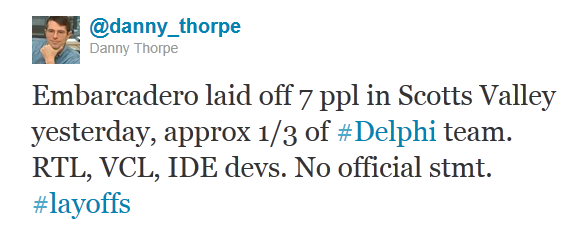An inflammatory title, perhaps, but this is how I’m reading the situation. I’ve also been writing and rewriting this post all weekend, so you’re seeing the polished toned-down version.
 First some background.
First some background.
1. A couple of weeks ago, Embarcadero released RAD Studio XE2. Personally speaking, I consider this to be the most important release of the Delphi ecosystem since Delphi 2 or even Delphi 1. Two reasons for this: 64-bit support, long promised and even longer forthcoming; and FireMonkey. Of the two, FireMonkey was the most interesting: a cross-platform run-time that targets Windows and OS X, together with compiler support for both. (In my view the iOS support is just there for a tick in some marketer’s list: see Tim Anderson’s excellent post about how to actually set this up and a discussion about the issues.) I wrote a post describing DevExpress’ support for XE2, just before its release.
2. On Friday, I and any number of other people saw this tweet from Danny Thorpe. Yes, that Danny Thorpe. He obviously has some contacts still.

3. And then yesterday, Sunday, Tony de la Lama, Senior VP of R&D at Embarcadero, makes his very first blog post in two-plus years of working for Embarcadero, ignores this news (unless you ponder that it was his first post and he published it on a weekend), and promulgates a rosy view of R&D growing by leaps and bounds through offshoring (IDE development in Spain, much of the rest in “European development centers”). In fact, through the grapevine we understand that the team in St Petersburg – the team that produced FireMonkey – is being grown rapidly too.
4. Last week, you may have also heard that Microsoft had this conference called BUILD (or “//build/”) where they talked a lot about Windows 8, Metro apps, WinRT, ARM slates/tablets, and all kinds of other goodness. Yes, “old-style” Windows apps will still work on Windows 8, but the fancy touch-enabled Metro stuff uses a brand new run-time (the afore-mentioned WinRT) that is not Win32. This has been developed specifically for touch-capable devices like slates and tablets that typically would use ARM chips. Windows 8 is probably due (a reasonably good consensus guess) Q4 2012, a year away, although you can now download a Developer Preview right now.
Now let’s bring it all together.
1. From de la Lama’s post we see that part of the goal is mobile devices, iOS and Android being specifically mentioned. A definite win for FireMonkey there, although there’s a lot still to do (compiler and debugger support being two big issues).
2. ARM devices that are targeted by Windows 8 and WinRT will not run Win32 code (PCs will, as mentioned above). To create Metro apps with Delphi will require a new compiler and run-time support. VCL is built upon Win32, and assumptions about that run-time is deep within the code. Another win for FireMonkey; VCL is painted into a corner.
3. Like it or not, VCL development is being ratcheted down. This is obvious from the layoff and offshoring news, but it was also mentioned to us in the XE2 World Tour presentation our team attended in Moscow. The best demos on the World Tour were by far the cross-platform FireMonkey demos. Embarcadero want to concentrate on cross-platform app development and the only way to do that is by using FireMonkey with the appropriate compiler support. It’s a major differentiator for them.
So, in my opinion, all this says that FireMonkey is going to be the technology Embarcadero are going to concentrate on going forward for RAD Studio. I think we’ll be hearing a lot more about FireMonkey in the months ahead and that a new RAD Studio roadmap will be forthcoming integrating support for other devices, especially on the mobile front. They also have a great deal of work to do in creating FireMonkey controls and components. We also conclude from the information we gleaned from the World Tour that the VCL will be maintained in its current form (bug fixes and the like), but no major new functionality will be introduced for it.
We at DevExpress are already talking about what this all means for us. As I said before, our plans are laid for v2011 vol.2 and we can’t change direction too drastically from them at this late stage (code-freeze is perhaps some 6-8 weeks away), but for 2012? We’ll certainly be discussing in depth our RAD Studio support at our annual Summit late November, early December.
Free DevExpress Products - Get Your Copy Today
The following free DevExpress product offers remain available. Should you have any questions about the free offers below, please submit a ticket via the
DevExpress Support Center at your convenience. We'll be happy to follow-up.